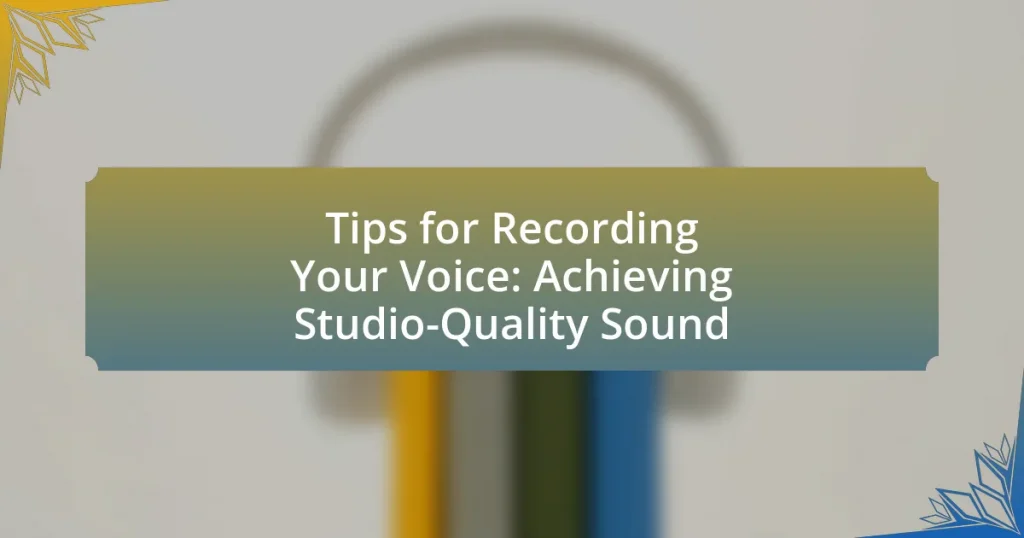The article focuses on the analysis and improvement of singing performance, emphasizing the systematic evaluation of vocal techniques, delivery, and presentation. Key aspects discussed include self-analysis, the importance of feedback, goal setting, and specific techniques for enhancing vocal skills such as breath control and pitch accuracy. The article also highlights the significance of maintaining vocal health and provides strategies for effective practice, including the use of recording tools and structured routines. Overall, it serves as a comprehensive guide for singers seeking to enhance their performance through targeted self-assessment and continuous improvement.

What does it mean to analyze and improve your singing performance?
Analyzing and improving your singing performance means systematically evaluating your vocal techniques, delivery, and overall presentation to enhance your skills. This process involves assessing aspects such as pitch accuracy, breath control, tone quality, and emotional expression. By identifying strengths and weaknesses through self-assessment or feedback from others, singers can implement targeted practice strategies to address specific areas for improvement. Research indicates that structured practice and feedback can lead to measurable enhancements in vocal performance, as seen in studies on vocal pedagogy that emphasize the importance of reflective practice in skill development.
How can self-analysis enhance your singing skills?
Self-analysis can enhance singing skills by allowing singers to identify their strengths and weaknesses. By critically evaluating their vocal techniques, pitch accuracy, and emotional expression, singers can make targeted improvements. Research indicates that self-assessment fosters greater awareness of vocal habits, leading to more effective practice strategies. For instance, a study published in the Journal of Voice found that singers who engaged in self-reflection showed significant progress in vocal control and performance quality. This process of self-evaluation not only promotes skill development but also builds confidence, enabling singers to perform more effectively.
What specific aspects of singing should you analyze?
To analyze singing effectively, focus on aspects such as pitch accuracy, vocal tone quality, breath control, diction, phrasing, and emotional expression. Pitch accuracy refers to the singer’s ability to hit the correct notes consistently, which is essential for musicality. Vocal tone quality encompasses the richness and clarity of the voice, impacting how the performance is perceived. Breath control is crucial for sustaining notes and managing vocal dynamics, while diction affects the clarity of lyrics. Phrasing involves the way a singer shapes musical phrases, contributing to the overall interpretation of the song. Lastly, emotional expression conveys the intended feelings of the piece, enhancing audience connection. Each of these aspects plays a vital role in a singer’s overall performance quality.
How can recording your performances aid in self-analysis?
Recording performances aids in self-analysis by providing an objective reference point for evaluation. When singers listen to their recordings, they can identify strengths and weaknesses in pitch, tone, and technique that may not be apparent during live performance. Research indicates that auditory feedback enhances self-awareness and facilitates targeted improvement, as singers can compare their recordings against professional standards or their own goals. This method allows for a structured approach to practice, enabling singers to track progress over time and make informed adjustments to their technique.
Why is feedback important in improving singing performance?
Feedback is crucial in improving singing performance because it provides singers with specific insights into their vocal technique, pitch accuracy, and overall delivery. This information allows singers to identify areas for improvement and make necessary adjustments. Research indicates that feedback enhances learning and skill acquisition; for instance, a study published in the Journal of Voice found that singers who received constructive feedback showed significant improvements in vocal quality and pitch control compared to those who did not receive feedback. Therefore, feedback serves as a vital tool for singers to refine their skills and achieve better performance outcomes.
Who should you seek feedback from?
You should seek feedback from vocal coaches, experienced singers, and trusted peers. Vocal coaches provide professional insights based on their expertise in technique and performance, helping identify areas for improvement. Experienced singers can offer practical advice and share their own experiences, which can be invaluable for personal growth. Trusted peers, such as fellow musicians or friends with a good ear, can provide honest and constructive criticism, contributing to a well-rounded perspective on your singing performance.
What methods can be used to gather constructive feedback?
To gather constructive feedback, methods such as surveys, one-on-one interviews, peer reviews, and performance recordings can be utilized. Surveys allow for anonymous responses, encouraging honest feedback, while one-on-one interviews facilitate in-depth discussions about specific areas of improvement. Peer reviews involve colleagues providing insights based on their observations, which can highlight strengths and weaknesses. Additionally, recording performances and reviewing them can help identify areas for improvement through self-assessment. These methods are effective as they provide diverse perspectives and actionable insights, essential for enhancing singing performance.
What role does goal setting play in improving singing performance?
Goal setting plays a crucial role in improving singing performance by providing clear objectives that guide practice and development. When singers establish specific, measurable, achievable, relevant, and time-bound (SMART) goals, they create a structured approach to their training, which enhances focus and motivation. Research indicates that goal setting can lead to increased performance levels; for instance, a study published in the Journal of Applied Sport Psychology found that athletes who set goals showed significantly improved performance compared to those who did not. This principle applies to singing, as setting goals helps singers track their progress, identify areas for improvement, and maintain accountability, ultimately leading to enhanced vocal skills and confidence.
How can you set achievable goals for your singing?
To set achievable goals for your singing, start by identifying specific areas you want to improve, such as vocal range, pitch accuracy, or breath control. Break these areas down into smaller, measurable objectives, like practicing scales for 15 minutes daily or learning one new song each week. Research indicates that setting SMART goals—Specific, Measurable, Achievable, Relevant, and Time-bound—enhances performance and motivation, as shown in studies on goal-setting theory by Locke and Latham. By regularly assessing your progress and adjusting your goals as needed, you can maintain a clear focus on your development in singing.
What are some common goals singers should consider?
Common goals singers should consider include improving vocal technique, expanding vocal range, enhancing stage presence, and increasing repertoire. Improving vocal technique involves mastering breath control and pitch accuracy, which are essential for delivering a polished performance. Expanding vocal range allows singers to tackle a wider variety of songs, making them more versatile. Enhancing stage presence is crucial for engaging the audience, as it can significantly impact the overall performance experience. Increasing repertoire not only showcases a singer’s versatility but also prepares them for different performance opportunities. These goals are foundational for any singer aiming to analyze and improve their singing performance effectively.

How can you assess your vocal technique?
To assess your vocal technique, record your singing and analyze the playback for pitch accuracy, tone quality, and breath control. This method allows you to objectively evaluate your performance by identifying areas that need improvement. Research indicates that self-assessment through recording can enhance vocal skills, as it provides immediate feedback and helps in recognizing inconsistencies in technique. Additionally, seeking feedback from a qualified vocal coach can further refine your assessment, as they can offer expert insights into your vocal strengths and weaknesses.
What are the key components of vocal technique?
The key components of vocal technique include breath control, vocal resonance, pitch accuracy, diction, and articulation. Breath control is essential for sustaining notes and managing vocal power, as it allows singers to maintain a steady airflow while singing. Vocal resonance involves the amplification and quality of sound produced, which is influenced by the shape and size of the vocal tract. Pitch accuracy ensures that singers hit the correct notes, which is fundamental for musicality. Diction refers to the clarity of pronunciation, impacting the intelligibility of lyrics, while articulation involves the precise formation of sounds, contributing to the overall expressiveness of the performance. These components are critical for effective singing and are supported by vocal pedagogy, which emphasizes their importance in developing a strong vocal foundation.
How does breath control affect your singing?
Breath control significantly affects singing by enabling sustained notes, dynamic expression, and vocal stability. Effective breath control allows singers to manage airflow, which is crucial for producing clear and powerful sounds. Research indicates that singers with strong breath control can maintain pitch accuracy and vocal health, as proper support reduces strain on the vocal cords. For instance, a study published in the Journal of Voice highlights that singers who practice breath control techniques demonstrate improved vocal endurance and reduced fatigue, underscoring the importance of this skill in enhancing overall singing performance.
What techniques can improve your vocal range?
To improve vocal range, techniques such as vocal exercises, proper breath control, and warm-ups are essential. Vocal exercises like scales and arpeggios help stretch the vocal cords, while breath control techniques, including diaphragmatic breathing, support sustained notes and higher pitches. Warm-ups prepare the voice for singing, reducing the risk of strain and enhancing flexibility. Research indicates that consistent practice of these techniques can lead to measurable improvements in vocal range, as evidenced by studies showing that singers who engage in structured vocal training experience significant increases in their upper and lower vocal limits.
How can you evaluate your pitch accuracy?
To evaluate your pitch accuracy, use a digital tuner or pitch detection software that provides real-time feedback on your singing. These tools measure the frequency of your voice and compare it to the desired pitch, allowing you to see how closely you match the target notes. Research shows that consistent use of pitch detection tools can improve pitch accuracy by up to 30% in singers over a period of practice, as indicated in studies on vocal training effectiveness.
What tools can assist in pitch evaluation?
Tools that can assist in pitch evaluation include tuning apps, pitch detection software, and digital audio workstations (DAWs). Tuning apps, such as Cleartune and Pano Tuner, provide real-time feedback on pitch accuracy, allowing singers to adjust their notes accordingly. Pitch detection software, like Melodyne and Auto-Tune, analyzes recorded performances to identify pitch discrepancies and suggest corrections. Digital audio workstations, such as Logic Pro and Ableton Live, offer built-in pitch analysis tools that help users visualize and correct pitch issues in their recordings. These tools are widely used by musicians and vocalists to enhance their pitch accuracy and overall performance quality.
How can ear training improve pitch accuracy?
Ear training can improve pitch accuracy by enhancing an individual’s ability to recognize and reproduce musical notes accurately. This training involves exercises that develop auditory skills, allowing singers to identify intervals, chords, and melodies more effectively. Research indicates that consistent ear training can lead to measurable improvements in pitch recognition and singing accuracy, as demonstrated in a study published in the Journal of Research in Music Education, which found that participants who engaged in ear training showed significant gains in pitch matching abilities compared to those who did not.
What is the significance of vocal health in performance?
Vocal health is crucial in performance as it directly impacts a singer’s ability to produce sound effectively and maintain vocal quality. Healthy vocal cords allow for optimal resonance, pitch control, and stamina during performances. Research indicates that singers with good vocal health experience fewer vocal injuries and can perform consistently at a high level, enhancing their overall artistic expression. For instance, a study published in the Journal of Voice found that singers who engaged in proper vocal care techniques reported a 30% reduction in vocal fatigue and strain, underscoring the importance of maintaining vocal health for sustained performance excellence.
How can you maintain vocal health while practicing?
To maintain vocal health while practicing, singers should prioritize hydration, proper warm-ups, and vocal rest. Hydration is essential as it keeps the vocal cords lubricated, reducing the risk of strain; drinking water before and during practice is recommended. Proper warm-ups, such as gentle humming or lip trills, prepare the vocal cords for more demanding exercises, minimizing the chance of injury. Additionally, incorporating regular vocal rest periods allows the vocal cords to recover, especially after intense practice sessions. Research indicates that consistent hydration and warm-up routines significantly contribute to vocal longevity and health, as highlighted in studies by the National Center for Voice and Speech.
What are common vocal health issues to be aware of?
Common vocal health issues include vocal nodules, laryngitis, and vocal cord paralysis. Vocal nodules, often caused by overuse or misuse of the voice, are small, callous-like growths on the vocal cords that can lead to hoarseness and a reduced vocal range. Laryngitis, an inflammation of the larynx, can result from infections or excessive voice use, causing temporary voice loss and discomfort. Vocal cord paralysis occurs when the nerves controlling the vocal cords are damaged, leading to difficulties in speaking and breathing. These issues can significantly impact singing performance and require attention for effective vocal health management.

What strategies can you implement to improve your singing performance?
To improve your singing performance, implement consistent vocal exercises, proper breathing techniques, and regular practice. Consistent vocal exercises, such as scales and arpeggios, strengthen vocal cords and enhance range. Proper breathing techniques, including diaphragmatic breathing, support vocal control and stamina. Regular practice, ideally daily, reinforces muscle memory and builds confidence. Research indicates that structured vocal training can lead to measurable improvements in pitch accuracy and vocal endurance, as shown in studies by the National Center for Biotechnology Information.
How can regular practice enhance your singing abilities?
Regular practice enhances singing abilities by improving vocal technique, increasing vocal range, and developing muscle memory. Consistent vocal exercises strengthen the vocal cords and improve breath control, which are essential for producing a clear and powerful sound. Research indicates that musicians who practice regularly show significant improvements in their skills; for instance, a study published in the journal “Psychology of Music” found that deliberate practice leads to measurable gains in performance quality. Additionally, regular practice allows singers to experiment with different styles and techniques, leading to greater versatility and confidence in their performances.
What should a structured practice routine include?
A structured practice routine should include goal setting, warm-up exercises, skill development, performance practice, and self-assessment. Goal setting establishes clear objectives, such as improving vocal range or mastering a specific song. Warm-up exercises prepare the voice and body, reducing the risk of strain. Skill development focuses on techniques like breath control, pitch accuracy, and diction, which are essential for effective singing. Performance practice involves rehearsing songs in a performance context to build confidence and stage presence. Finally, self-assessment allows singers to evaluate their progress and identify areas for improvement, ensuring a comprehensive approach to enhancing their singing performance.
How can you incorporate warm-up exercises effectively?
Incorporating warm-up exercises effectively involves starting with gentle vocalizations, such as humming or lip trills, to gradually prepare the vocal cords. This method increases blood flow and flexibility, reducing the risk of strain. Research indicates that a structured warm-up routine can enhance vocal performance and endurance, as shown in a study by the National Center for Biotechnology Information, which found that singers who engaged in systematic warm-ups exhibited improved vocal range and stability. Therefore, implementing a consistent warm-up routine that includes various vocal exercises can significantly enhance singing performance.
What role does performance experience play in improvement?
Performance experience significantly enhances improvement by providing practical application of skills in real-time scenarios. Engaging in live performances allows singers to develop stage presence, manage performance anxiety, and receive immediate feedback from audiences, which is crucial for growth. Research indicates that performers who regularly engage in live settings show marked improvements in vocal technique and emotional expression, as they learn to adapt their skills to varying environments and audience reactions. This experiential learning process is supported by studies such as those conducted by the Journal of Voice, which highlight the correlation between performance frequency and vocal proficiency.
How can participating in live performances boost your confidence?
Participating in live performances boosts confidence by providing real-time feedback and experience in front of an audience. Engaging in these performances allows individuals to confront their fears and anxieties, leading to increased self-assurance over time. Research indicates that repeated exposure to performance situations can significantly reduce performance anxiety, as evidenced by a study published in the Journal of Music Therapy, which found that musicians who regularly performed live reported higher levels of self-esteem and confidence. This direct interaction with an audience fosters a sense of accomplishment and validation, reinforcing the performer’s belief in their abilities.
What are some ways to gain performance experience?
To gain performance experience, individuals can participate in local open mic nights, join community theater productions, or engage in school or college music programs. These opportunities allow performers to practice in front of an audience, receive feedback, and build confidence. For instance, open mic nights often attract diverse audiences, providing a platform for singers to showcase their talent and refine their stage presence. Community theater productions typically involve collaboration with other artists, enhancing teamwork skills and offering valuable insights into the performance process. Additionally, involvement in school or college music programs can provide structured training and performance opportunities, contributing to overall skill development in singing.
What are some best practices for continuous improvement in singing?
Best practices for continuous improvement in singing include regular vocal exercises, consistent practice, and seeking feedback. Regular vocal exercises enhance vocal range and control, while consistent practice solidifies techniques and builds muscle memory. Seeking feedback from vocal coaches or peers provides valuable insights for improvement. Research indicates that structured practice, such as the Deliberate Practice model, significantly enhances skill acquisition in music, supporting the effectiveness of these practices.
How can you stay motivated in your singing journey?
To stay motivated in your singing journey, set clear, achievable goals that provide direction and a sense of accomplishment. Research shows that goal-setting enhances motivation by creating a roadmap for progress, which can lead to increased satisfaction and persistence in practice. For instance, a study published in the Journal of Applied Psychology found that individuals who set specific goals were more likely to achieve higher performance levels compared to those who did not. Additionally, regularly tracking your progress and celebrating small victories can reinforce motivation, as it allows you to see tangible results from your efforts.
What resources are available for ongoing learning and improvement?
Resources available for ongoing learning and improvement in singing performance include online courses, vocal coaching, and practice apps. Online platforms like MasterClass and Udemy offer structured courses taught by professional singers, providing valuable techniques and insights. Vocal coaching, whether in-person or virtual, allows for personalized feedback and tailored exercises to enhance vocal skills. Additionally, practice apps such as Smule and Yousician offer interactive tools for singers to refine their abilities through guided practice and real-time feedback. These resources collectively support continuous development in singing performance.















